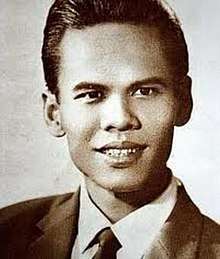Suraphol Sombatcharoen
Suraphol Sombatcharoen (September 25, 1930 – August 16, 1968) (Thai: สุรพล สมบัติเจริญ) was a Thai luk thung singer. Dubbed the "King of Luk Thung", he was one of the first major stars of Thailand's own country music genre. He was fatally shot while seated in his own car after a live performance in Nakhon Pathom.
Suraphol Sombatcharoen | |
|---|---|
 Thailand's "King of Luk thung". | |
| Background information | |
| Birth name | Lamduan Sombatcharoen |
| Born | September 25, 1930 Suphan Buri, Thailand |
| Died | August 16, 1968 (aged 37) Nakhon Pathom, Thailand |
| Genres | Luk thung |
| Instruments | Singer |
| Years active | 1950-1968 |
Biography
Born Lamduan Sombatcharoen in Suphan Buri Province, he chose Suraphol as his stage name. His first hit came in 1954 with "Nam Ta Sao Wieng" ("Tears of a Lao Girl"). It marked the emergence of luk thung, a Thai counterpart to such crooning styles as Japanese enka and Indonesian kroncong, and embodied such influences as Hollywood film music, American country music, Malay pop and Afro-Cuban rhythms.
Enjoying popularity at the same time as Elvis Presley and The Beatles, Suraphol was sometimes called the "Thai Elvis". By the 1960s, there was no Thai performer who was better known than Suraphol Sombatcharoen.
Suraphol composed more than 100 songs. Among his best known are "Sao Suan Taeng" ("The Girl from the Cucumber Field"), "Mong" ("Look"), "Nam Ta Ja Tho" ("The Tears of a Corporal"), "Khong Plom" ("Fake Stuff"), and "Muai Cham" ("Broken-Hearted Chinese Girl").
Shortly before his murder, he released his last and most memorable song, "Siphok Pi Haeng Khwam Lang" ("สิบหกปีแห่งความหลัง" or "16 Years of Our Past"), in which told sadly about the end of his own 16-year marriage, reflecting on both the happiness and bitterness of the union.
Another of his songs, the mournful "Mai Luem" ("Don't forget"), was featured as a poignant refrain in Pen-Ek Ratanaruang's 2001 film, Monrak Transistor.
Legacy
Suraphol's recordings are widely available in Thailand, from shopping malls such as MBK Center in Bangkok to rural markets.
Whenever Suraphol is commemorated on radio, the song that's inevitably played is his "16 Years of Our Past", and the 16-year period has become symbolic for numerologically minded Thai people.
The 1983 documentary "Two Faces of Thailand: A Musical Portrait" (part of the Beats of the Heart series) included a segment on luk thung, following Surachai Sombacharoen (son of Suraphol) on tour with a show that included a tribute to Suraphol, and interviews with family members.[1][2]
And so it came to pass that on the 33rd anniversary of Suraphol's death in 2001, the third generation of the Sombatcharoen family luk thung singers made his debut. The son of Surachai Sombacharoen (and grandson of Suraphol), Surabodin sang in front of a packed hall at the Thailand Cultural Centre on August 16, 2001. He was 16 years old, and of course sang "16 Years of Our Past".
Albums
- 16 Years The Past (16 ปีแห่งความหลัง)
- Siew Sai (เสียวใส้)
- Khong Plom (ของปลอม)
- Khon Hua Lan (คนหัวล้าน)
- Sae See Aei Lue Jek Nang (แซซี้อ้ายลือเจ๊กนัง)
- Yik Tao Lo Soi (ยิกเท้าโหละซั๊วะ)
- Smell Love in "Pa-Sang" (มนต์รักป่าซาง)
- Klin Kam Hom Chuen Jai (กลิ่นแก้มหอมชื่นใจ)
See also
References
- "Movie Reviews". April 24, 2020 – via NYTimes.com.
Sources
- Khanthong, Thanong (September 6, 2002). "OVERDRIVE: PM Thaksin to embrace Suraphol Doctrine?". The Nation.
- "SUNDAY TALK: 'Look thung' family keeps going strong", August 26, 2001, The Nation.
- Napack, Jonathan (May 12, 1999) "A revival of authentic Thai pop", The New York Times